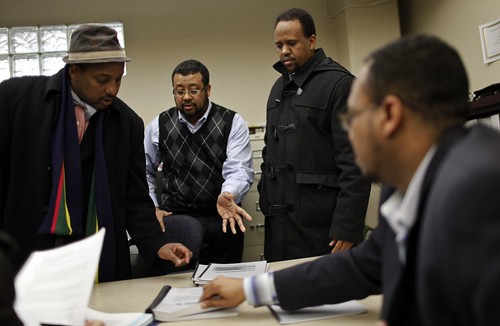
Somalian-Americans are being harrassed by the US government. They are being prevented from freely transfering funds to their family members living in Africa., a photo by Pan-African News Wire File Photos on Flickr.
Barclays' Somalia Remittance Shutdown will Hurt Millions
By GIANLUCA MEZZOFIORE
September 6, 2013 9:09 AM GMT
IBT
Barclays Bank has been criticised by the UK's leading think tank on international development for its decision to close its 250 money-transfer businesses in Somalia.
The decision was described by the Overseas Development Institute (ODI) as "unwarranted, unnecessary and a threat" to people in need.
The ODI has said it is possible to maintain cash transfers to Somalia while monitoring them to avoid a diversion of funds. Its president Kevin Watkins cited new research showing that a transfer scheme worth £57m, set up in response to the 2011 famine, went through to help almost 1million people without falling into the wrong hands.
Barclays took the decision to cut its money service businesses (MSBs) from the end of September to avoid the risk of falling victim of money-laundering regulations and "unwittingly be facilitating [...] terrorist financing".
About £800m in remittances - a significant part of the country's GDP - is channelled to the country by the 1.5m Somalis living overseas thanks to the hawala, or small money-transfer businesses. An estimated £320m is sent to Somalia by the UK's Somali diaspora alone, which far exceeds international aid.
British MP Rushanara Ali, who campaigned to keep the money flowing, said banks "are scared of the impact if they fall foul of the regulators". The case often cited is the UK's HSBC bank that was fined £1.2bn for "blatant failure" to implement anti-money laundering controls.
However, Watkins said that the HSBC case "is a weak analogue for Barclays engagement in Somalia". The British bank, indeed, was charged with allowing £429bn in wired transfers from Mexico, of which at least £564m were associated with drug trafficking.
But such activities "are hardly comparable to the operations of the hawala system and money transfer agencies," Watkins wrote in his letter to Antony Jenkins, group chief executive for Barclays Bank.
"There is a world of difference between providing aid banking services to drug barons in Mexico and delivering a service that pays for health, education, food, housing materials and small enterprises in Somalia," he wrote. "If aid agencies can find a way to operate efficiently in Somalia then surly it's not beyond the capability of Barclays."
The campaign against Barclays shutdown included Olympic gold winner Mo Farah, who came to the UK at the age of eight from war-torn Mogadishu. The runner urged his 800,000-plus Twitter followers to support "vital" money flows to families in Somalia.
"It is so important that the government and the banks realise the incredibly serious threat this poses, and work with the remittance industry to find a solution," he told the BBC.
"Millions of Somalis as well as people across the developing world depend on it."
Dahabshiil, the largest money transfer business providing services to Somalia, has said Barclays' decision could see money transfers pushed into the hands of "unregulated and illegal providers".
No comments:
Post a Comment